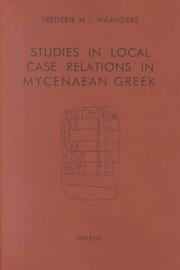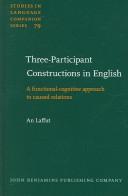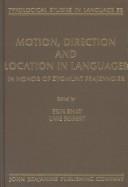| Listing 1 - 10 of 44 | << page >> |
Sort by
|
Book
ISBN: 9788876892912 8876892915 Year: 2016 Publisher: Roma : GB, Giorgio Bretschneider editore,
Abstract | Keywords | Export | Availability | Bookmark
 Loading...
Loading...Choose an application
- Reference Manager
- EndNote
- RefWorks (Direct export to RefWorks)
Book
Year: 1974
Abstract | Keywords | Export | Availability | Bookmark
 Loading...
Loading...Choose an application
- Reference Manager
- EndNote
- RefWorks (Direct export to RefWorks)
Kongo language --- English language --- Locative constructions.
Book
Year: 1975 Volume: 83. Publisher: Tervuren, Belgique : Musée royal de l'Afrique centrale,
Abstract | Keywords | Export | Availability | Bookmark
 Loading...
Loading...Choose an application
- Reference Manager
- EndNote
- RefWorks (Direct export to RefWorks)
Bantu languages --- Langues bantoues --- Locative constructions --- Locatifs

ISBN: 9004674551 905063107X 9789050631075 9789004674554 Year: 1997 Publisher: Leiden ;Boston Brill
Abstract | Keywords | Export | Availability | Bookmark
 Loading...
Loading...Choose an application
- Reference Manager
- EndNote
- RefWorks (Direct export to RefWorks)
The aim of this investigation is to determine the nature of the local case relations to be found in the Mycenaean texts, and the forms by means of which these case relations are expressed. Though much work has already been done in this field, a re-examination of the relevant words and expressions in their contexts may still be rewarding. To put the Mycenaean data in relief, the language of the Homeric epics will receive due attention, and occasionally also dialect inscriptions and post-Homeric literary sources, as need may be.
Greek language --- Inscriptions, Linear B. --- Case. --- Inscriptions, Linear B --- Case --- Locative constructions --- Locative constructions.
Book
ISBN: 1282694626 9786612694622 0262259028 0262266105 9780262259026 9780262013307 0262013304 9780262513067 0262513064 9780262266109 9781282694620 6612694629 Year: 2010 Publisher: Cambridge, Mass.
Abstract | Keywords | Export | Availability | Bookmark
 Loading...
Loading...Choose an application
- Reference Manager
- EndNote
- RefWorks (Direct export to RefWorks)
A new account of the peculiar syntax of psychological verbs argues that experiencers are grammaticalized as locative phrases. Experiencers--grammatical participants that undergo a certain psychological change or are in such a state--are grammatically special. As objects (John scared Mary; loud music annoys me), experiencers display two peculiar clusters of nonobject properties across different languages: their syntax is often typical of oblique arguments and their semantic scope is typical of subjects. In The Locative Syntax of Experiencers, Idan Landau investigates this puzzling correlation and argues that experiencers are syntactically coded as (mental) locations. Drawing on results from a range of languages and theoretical frameworks, Landau examines the far-reaching repercussions of this simple claim. Landau shows that all experiencer objects are grammaticalized as locative phrases, introduced by a dative/locative preposition. "Bare" experiencer objects are in fact oblique, too, the preposition being null. This preposition accounts for the oblique psychological properties, attested in case alternations, cliticization, resumption, restrictions on passive formation, and so on. As locatives, object experiencers may undergo locative inversion, giving rise to the common phenomenon of quirky experiencers. When covert, this inversion endows object experiencers with wide scope, attested in control, binding, and wh-quantifier interactions. Landau's synthesis thus provides a novel solution to some of the oldest puzzles in the generative study of psychological verbs. The Locative Syntax of Experiencers offers the most comprehensive description of the syntax of psychological verbs to date, documenting their special properties in more than twenty languages. Its basic theoretical claim is readily translatable into alternative frameworks. Existing accounts of psychological verbs either consider very few languages or fail to incorporate other theoretical frameworks; this study takes a broader perspective, informed by findings of four decades of research.
Grammar, Comparative and general --- Semantics --- Locative constructions. --- Psychological aspects. --- Locative constructions (Grammar) --- Case --- Syntax --- LINGUISTICS & LANGUAGE/General --- Lexicology. Semantics --- Grammar --- Psycholinguistics --- Locative constructions --- Psychological aspects --- Linguistics --- Philology
Book
ISBN: 8476353391 Year: 1998 Publisher: Madrid : Arco Libros,
Abstract | Keywords | Export | Availability | Bookmark
 Loading...
Loading...Choose an application
- Reference Manager
- EndNote
- RefWorks (Direct export to RefWorks)
Spanish language --- Espagnol (Langue) --- Locative contructions --- Grammar --- Locatifs --- Grammaire

ISSN: 01657763 ISBN: 9027230897 9789027230898 9789027293589 9027293589 1282155881 9786612155888 Year: 2006 Volume: 79 Publisher: Amsterdam Philadelphia John Benjamins Pub.
Abstract | Keywords | Export | Availability | Bookmark
 Loading...
Loading...Choose an application
- Reference Manager
- EndNote
- RefWorks (Direct export to RefWorks)
This study aims to give a systematic and comprehensive description of the constructions involved in three important types of alternation: the locative alternation, which is by far the most researched of the three, the image impression alternation and the material/product alternation. The author looks at the constructions as part of alternation, but also looks beyond the alternations, and analyzes and describes the constructions in their own right. They are analyzed as three-participant constructions with relational complements, construing causation of the three main subtypes of relations, namely intensive, circumstantial and possessive relations. Particular attention is paid to the concept of holicity, to the status of the prepositional phrase, and to collocational properties, which play a key role in the decision as to which alternate should be regarded as the unmarked one within its construction paradigm. The approach taken is inspired by systemic functional grammar and can broadly be characterized as cognitive-functional.
English language --- Grammar, Comparative and general --- Syntax --- Locative constructions --- Prepositions --- Locative constructions. --- Prepositions. --- Syntax. --- Comparative linguistics --- Grammar --- 802.0-56 --- 802.0-56 Engels: syntaxis; semantiek --- Engels: syntaxis; semantiek --- Locative constructions (Grammar) --- Case --- Prepositional phrases --- Grammar [Comparative and general ] --- Germanic languages --- Linguistics --- Philology --- English language - Syntax --- English language - Locative constructions --- Grammar, Comparative and general - Locative constructions --- English language - Prepositions

ISBN: 905063107X 9789050631075 Year: 1997 Publisher: Amsterdam : Gieben,
Abstract | Keywords | Export | Availability | Bookmark
 Loading...
Loading...Choose an application
- Reference Manager
- EndNote
- RefWorks (Direct export to RefWorks)
Inscriptions, Linear B. --- Greek language --- Case. --- Locative constructions. --- Inscriptions, Linear B --- Linear B inscriptions --- Minoan writing --- Inscriptions, Greek --- Inscriptions, Hieroglyphic --- Classical languages --- Indo-European languages --- Classical philology --- Greek philology --- Case --- Locative constructions --- Alphabet --- Greek language - Case. --- Greek language - Locative constructions.

ISBN: 1283312050 9786613312051 9027275211 9789027275219 9781588114426 1588114422 9781283312059 9027229643 1588114422 9789027229649 Year: 2003 Publisher: Amsterdam Philadelphia John Benjamins
Abstract | Keywords | Export | Availability | Bookmark
 Loading...
Loading...Choose an application
- Reference Manager
- EndNote
- RefWorks (Direct export to RefWorks)
This book contributes to an area of study that is of interest to linguists of all backgrounds. Typological in nature this volume presents data analysis from the major language families of Africa as well as Sino-Tibetan, Austronesian, Japanese, Indo-European, Siouan and Penutian. The 16 contributors to the volume share a commitment to examining the language phenomena pertaining to the volume's theme with a fresh eye. While most of the papers make reference to existing theoretical frameworks, each also makes a novel and sometimes surprising contribution to the body of knowledge and theory concer
Motion in language. --- Direction in language. --- Grammar, Comparative and general --- Locative constructions (Grammar) --- Linguistics --- Locative constructions. --- Case --- Syntax --- Direction in language --- Motion in language --- Locative constructions --- Grammar --- Grammar [Comparative and general ] --- Philology
Book
ISBN: 3631457944 9783631457948 Year: 1993 Volume: 179 Publisher: Frankfurt a. M.: Lang,
Abstract | Keywords | Export | Availability | Bookmark
 Loading...
Loading...Choose an application
- Reference Manager
- EndNote
- RefWorks (Direct export to RefWorks)
| Listing 1 - 10 of 44 | << page >> |
Sort by
|

 Search
Search Feedback
Feedback About UniCat
About UniCat  Help
Help News
News